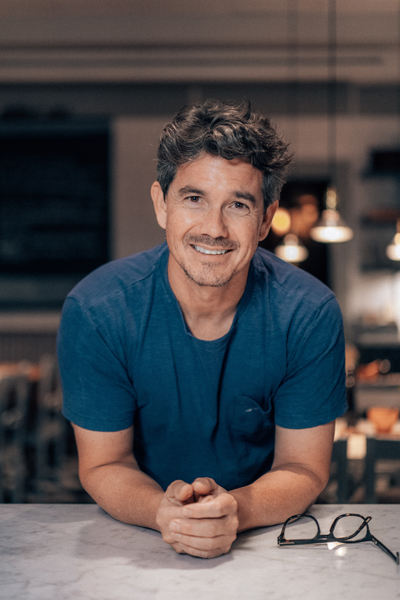 It took a snowboarding accident – mercifully minor – to jolt me into a major commitment to change. I was about to turn 50 and my relationship pattern resembled a revolving door. A UK-based psychologist who’d been helping me work out why, finally suggested Hoffman. At first, I resisted. But when yet another relationship ended, I realised I needed to confront the deeper forces shaping my life.
It took a snowboarding accident – mercifully minor – to jolt me into a major commitment to change. I was about to turn 50 and my relationship pattern resembled a revolving door. A UK-based psychologist who’d been helping me work out why, finally suggested Hoffman. At first, I resisted. But when yet another relationship ended, I realised I needed to confront the deeper forces shaping my life.
The Process was transformational. Between the sessions with my psychologist and the work I did on the course, I became aware of my ADHD traits. Even before the course began, I broke down crying as I completed the preparatory work. For the first time, I could clearly see the impact of my childhood: the absence of emotional support, the strictness of boarding school, and the way I had internalised shame.
I had always blamed my coping mechanisms – workaholism, people-pleasing, self-sabotage – but I as the course unfolded, I learned those were just symptoms. The root was shame, carried silently for decades.
To understand where that came from, I needed to see how the circumstances of my life – and my birth – had created expectations and beliefs about myself and the world that I’d carried into adulthood. I was born on the island of Palma de Mallorca, to a Spanish father and a Swedish mother. My father was an only child who worked tirelessly and became a very successful real estate developer. That success came at the cost of presence – he was often away, and he died when I was only 17.
My mother came from a conservative but open-minded family in rural Sweden. Though sociable, she was naturally introverted, and every summer she would return to Sweden for two months, leaving my sister and me behind in Mallorca. At the time, I accepted this as normal, but years later I understood how deeply those absences imprinted a sense of emotional abandonment in me.
Growing up, I was often labelled a ‘difficult child.’ I clashed with teachers and longed for guidance that didn’t quite materialise. My parents – out of love and a belief in discipline – sent me to a strict all-boys Opus Dei boarding school in Pamplona. The culture there was rigid, even repressive, with heavy doses of machismo. Small things, like not being allowed to cross our legs, were enforced as rules. Food was passed through hatches so we wouldn’t see the female cooks. Violence, shame, and suppressed rage were part of the environment. That is where I developed a constant fight-or-flight state – something that followed me into my adult life.
 Despite this, I went on to study business in Munich and London, later joining JP Morgan and Goldman Sachs. By my early 30s, I’d completed a master’s degree in Corporate Finance and successfully developed a large real estate project in London’s Shoreditch. But when the global financial crisis hit in 2007, Spain’s market collapsed. I returned to Mallorca to help stabilise the family real estate business, and to support my mother and sister.
Despite this, I went on to study business in Munich and London, later joining JP Morgan and Goldman Sachs. By my early 30s, I’d completed a master’s degree in Corporate Finance and successfully developed a large real estate project in London’s Shoreditch. But when the global financial crisis hit in 2007, Spain’s market collapsed. I returned to Mallorca to help stabilise the family real estate business, and to support my mother and sister.
Alongside the business challenges, I faced difficulties in my personal life. I married, divorced, remarried, and divorced again, becoming a father to two daughters, Mery and Alexandra. Despite my best intentions, my relationships were often short-lived, marked by recurring patterns I couldn’t explain. I poured myself into work and charity projects – including a campaign to protect children from sexual abuse, a cause close to my heart. But privately, I kept repeating cycles of failed intimacy and unresolved pain.
Fast-forward to the day I found myself on the Process unpacking all of this and discovering layer upon layer of shame.
In one exercise, I released my pent-up anger by batting a pillow until my hands blistered. Behind the rage was a lifetime of feeling abandoned. But afterward, I felt lighter, freer, more alive. It was as though I had given language and form to wounds I didn’t even know how to name.
Hoffman also gave me new tools to take back into the world. I began to recognise unhealthy relationship patterns – women I would once have been drawn to, roles I would once have played – and I could step back with clarity. Not long after completing the course I stopped dating for a while, not out of fear, but because what I wanted from a relationship had shifted. I now sought reciprocity rather than rescue, presence rather than performance.
 Most importantly, the changes touched my family life. My daughters tell me I’m more present and attentive. They even said they preferred ‘the new me’ after the Process. With their mothers, our co-parenting relationships became less blaming and more constructive. At work, I became less of a traditional boss and more of a collaborator. My team began to feel freer, more motivated, and more connected.
Most importantly, the changes touched my family life. My daughters tell me I’m more present and attentive. They even said they preferred ‘the new me’ after the Process. With their mothers, our co-parenting relationships became less blaming and more constructive. At work, I became less of a traditional boss and more of a collaborator. My team began to feel freer, more motivated, and more connected.
The Process wasn’t a magic wand – real change takes practice. Like training for a marathon, small consistent steps matter. I continue to attend Hoffman check-ins, refresher days, and coaching sessions, integrating the tools into daily life.
Today, I still run hotels and real estate projects in Mallorca, but I also have a new vision: developing Jizõ, a Guardian Angel app to support travellers in health and safety worldwide. It feels like a continuation of my caretaker instinct, but now directed with awareness and purpose.
Hoffman did not erase my past, but it reframed it. It helped me see that my difficulties in relationships were not because I disliked women or resented my parents, but because I lacked the stable emotional foundation I needed as a child. By recognising and healing those wounds, I’ve been able to step into life with more compassion – for myself and for others.
Thank you to Christian for sharing his Process Story. You can find out more about Christian’s hotels here and the Jizō app here





 Sign up to receive monthly newsletters from Hoffman
Sign up to receive monthly newsletters from Hoffman